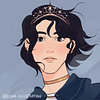Take a photo of a barcode or cover
My favorite stories from Dickens are Great Expectation and Hard Times, but Oliver Twist wasn't bad either. I just didn't find the characters interesting enough.
So when do they start singing?
Happy to finally have one Dickensian book under my belt, but I'm going to need to splash around in the shallow end for a while before I go back for more...
...oh, and I need a hug too.
Happy to finally have one Dickensian book under my belt, but I'm going to need to splash around in the shallow end for a while before I go back for more...
...oh, and I need a hug too.
Almost as enjoyable as the musical, hard to get into though, it should really be a 4 1/2
Ho iniziato a leggere questo libro credendo di conoscerne già la storia, avendo visto numerosi adattamenti cinematografici basati su di esso. Mi sbagliavo completamente, perchè da metà in poi la trama si è rivelata una sorpresa in quanto nessuno dei film visti ha mai coperto interamente i complicati intrecci che sono presenti nel testo.
E' questa la maestria di Dickens, dipanare pian piano una matassa intricata con chiarezza e con ritmo sempre più crescente. A momenti di nera ironia si alternano momenti neri e basta. Nulla ci è risparmiato del degrado della povera gente, della miseria e nemmeno della cattiveria e, straordinario a dirsi, nulla di tutto ciò è descritto con un linguaggio forte. Non ha bisogno, Dickens, di scrivere una bestemmia perchè il lettore la senta chiara e terribile venir fuori dalla bocca di Sikes; non ha bisogno di ripetere gli insulti proferiti da "Quel gentiluomo" (come lo chiama spesso), ma riesce lo stesso a farli risuonare attraverso le pagine.
La parole che viene più taciuta però è "prostituzione". In una sorta di rispetto o anche di timore, quello della prostituta è l'unico mestiere mai nominato (e le critiche furono grandi per aver parlato così "apertamente" di questa professione): ladri, assassini, imbroglioni.. tutto sembra quasi essere un crimine minore e per questo nominabile, rispetto a quello della prostituta. E' solo l'intuito e vari giri di parole che ci confermano che è questo il mestiere di Nancy:
" Forse non erano bellezze, ma erano parecchio colorite in faccia e piuttosto solide e vivaci. Essendo poi di modi piuttosto liberi e piacevoli, Oliver pensò che fossero delle ragazze davvero allegre. E non c'è dubbio che lo fossero."
"«Che mi significa questo? Mi brucino vivo! Lo sai chi e che cosa sei?» «E chi se lo scorda!», replicò la ragazza ridendo istericamente.."
"La vita della ragazza s'era sciupata nelle strade, nei postriboli e nei covi più degradati di Londra, ma in lei c'era ancora qualcosa dell'originaria natura femminile."
"«Sono io l'infame creatura di cui voi avete sentito parlare, che vive con i ladri e che, dal primo momento in cui i suoi occhi e i suoi sensi frequentarono le strade di Londra, non ha mai conosciuto una vita migliore o parole più gentili di quelle dei bassifondi, che Dio m'aiuti! Sì, allontanatevi da me, signora. Sono più giovane di quanto non dica il mio aspetto, ma a questo ci sono fin troppo abituata. Anche le donne più povere mi scansano quando passo lungo i marciapiedi affollati»."
Nancy, Sikes, Fagin, Dodger... sono i personaggi più forti, più potenti, quelli che più sconvolgono e che più coinvolgono. Oliver è solo uno spettatore o un pretesto, io lo definisco l'espediente che ci permette di venire in contatto con questi personaggi memorabili. Come spesso accade sono "i cattivi" ad attrarre maggiormente l'attenzione dello scrittore prima che del lettore.
Diceksn sembra trovarsi a suo agio nel descrivere miserie e nefandezze, molto più che nel descrivere bellezza e purezza (le parti in cui descrive dell'amore di Rose e Harry sono forse le meno riuscite dell'intera narrazione)e il lieto fine, non lascia del tutto soddisfatti. Si, Oliver vive felice e contento e tutti i "cattivi" sono giustiziati... ma nessuno si redime. Non c'è speranza per un furfante se non la morte (per impiccagione o per omicidio), nessun riscatto, nessuna ascesa sociale. Anche Oliver entra a far parte delle "persone per bene" in virtù della scoperta che suo padre era un "gentiluomo" (anche qui le virgolette sono necessarie), per gli altri ragazzi e bambini sfortunati incontrati lungo la narrazione la morte, la deportazione.. e, solo in un caso un lavoro onesto (mastro Bates alla fine, racconta frettolosamente l'autore, diventerà un mandriano).
In conclusione un romanzo amaro, ironico, divertente, scorrevole, interessante per scoprire la londra dell'epoca. Promosso, non a pieni voti perchè riservo le 5 stelline ai prossimi libri di Dickens che leggerò.
E' questa la maestria di Dickens, dipanare pian piano una matassa intricata con chiarezza e con ritmo sempre più crescente. A momenti di nera ironia si alternano momenti neri e basta. Nulla ci è risparmiato del degrado della povera gente, della miseria e nemmeno della cattiveria e, straordinario a dirsi, nulla di tutto ciò è descritto con un linguaggio forte. Non ha bisogno, Dickens, di scrivere una bestemmia perchè il lettore la senta chiara e terribile venir fuori dalla bocca di Sikes; non ha bisogno di ripetere gli insulti proferiti da "Quel gentiluomo" (come lo chiama spesso), ma riesce lo stesso a farli risuonare attraverso le pagine.
La parole che viene più taciuta però è "prostituzione". In una sorta di rispetto o anche di timore, quello della prostituta è l'unico mestiere mai nominato (e le critiche furono grandi per aver parlato così "apertamente" di questa professione): ladri, assassini, imbroglioni.. tutto sembra quasi essere un crimine minore e per questo nominabile, rispetto a quello della prostituta. E' solo l'intuito e vari giri di parole che ci confermano che è questo il mestiere di Nancy:
" Forse non erano bellezze, ma erano parecchio colorite in faccia e piuttosto solide e vivaci. Essendo poi di modi piuttosto liberi e piacevoli, Oliver pensò che fossero delle ragazze davvero allegre. E non c'è dubbio che lo fossero."
"«Che mi significa questo? Mi brucino vivo! Lo sai chi e che cosa sei?» «E chi se lo scorda!», replicò la ragazza ridendo istericamente.."
"La vita della ragazza s'era sciupata nelle strade, nei postriboli e nei covi più degradati di Londra, ma in lei c'era ancora qualcosa dell'originaria natura femminile."
"«Sono io l'infame creatura di cui voi avete sentito parlare, che vive con i ladri e che, dal primo momento in cui i suoi occhi e i suoi sensi frequentarono le strade di Londra, non ha mai conosciuto una vita migliore o parole più gentili di quelle dei bassifondi, che Dio m'aiuti! Sì, allontanatevi da me, signora. Sono più giovane di quanto non dica il mio aspetto, ma a questo ci sono fin troppo abituata. Anche le donne più povere mi scansano quando passo lungo i marciapiedi affollati»."
Nancy, Sikes, Fagin, Dodger... sono i personaggi più forti, più potenti, quelli che più sconvolgono e che più coinvolgono. Oliver è solo uno spettatore o un pretesto, io lo definisco l'espediente che ci permette di venire in contatto con questi personaggi memorabili. Come spesso accade sono "i cattivi" ad attrarre maggiormente l'attenzione dello scrittore prima che del lettore.
Diceksn sembra trovarsi a suo agio nel descrivere miserie e nefandezze, molto più che nel descrivere bellezza e purezza (le parti in cui descrive dell'amore di Rose e Harry sono forse le meno riuscite dell'intera narrazione)e il lieto fine, non lascia del tutto soddisfatti. Si, Oliver vive felice e contento e tutti i "cattivi" sono giustiziati... ma nessuno si redime. Non c'è speranza per un furfante se non la morte (per impiccagione o per omicidio), nessun riscatto, nessuna ascesa sociale. Anche Oliver entra a far parte delle "persone per bene" in virtù della scoperta che suo padre era un "gentiluomo" (anche qui le virgolette sono necessarie), per gli altri ragazzi e bambini sfortunati incontrati lungo la narrazione la morte, la deportazione.. e, solo in un caso un lavoro onesto (mastro Bates alla fine, racconta frettolosamente l'autore, diventerà un mandriano).
In conclusione un romanzo amaro, ironico, divertente, scorrevole, interessante per scoprire la londra dell'epoca. Promosso, non a pieni voti perchè riservo le 5 stelline ai prossimi libri di Dickens che leggerò.
adventurous
relaxing
medium-paced
Here are my feelings with Dickens:
I can watch his stories and enjoy them whereas I cannot stand to read him.
I understand that he is an Victorian writer, and yes, I do like A Christmas Carol (Because it's the only Dickens story that doesn't make my eyes burn.) Everything was subtle in that story, and I liked how Dickens incorporated the ghosts as his say on Victorian Society.
Oliver Twist is NOT subtle. In fact he wacks you over the head with a sledgehammer and screams at you throughout the whole book just to tell you that Victorian Society is bad. Yes, Charles, I get it, I really do, the society you lived in treated poor people like crap. Yes it was horrible conditions and you have all right to get angry at it, but can you NOT constantly interrupt the story with your rants?!
Besides that nitpick, everything else is cursed by the usual of Victorian Writing. Constant sentences and commas and colons where you want to stop and breath for a second but when you do, you are lost and forget what sentence you are on and then you get worried and re-read the whole paragraph again. The constant slang he uses, while realistic, is hard to pronounce and read (Thankfully this is just nitpick since the edition I got it in actually has a glossary of all the slang that Dickens had used.)
I know he wrote this when he was young; thankfully he got better with experience. This was given to us at A-Levels English Literature, and really, they couldn't of chosen anything else? I would of preferred something like Atonement at least. Story wise, we all know it. So thankfully they didn't force us to read the whole thing, only certain sections just to get quotes.
Charles, you are important, but good god just shut up sometimes.
I can watch his stories and enjoy them whereas I cannot stand to read him.
I understand that he is an Victorian writer, and yes, I do like A Christmas Carol (Because it's the only Dickens story that doesn't make my eyes burn.) Everything was subtle in that story, and I liked how Dickens incorporated the ghosts as his say on Victorian Society.
Oliver Twist is NOT subtle. In fact he wacks you over the head with a sledgehammer and screams at you throughout the whole book just to tell you that Victorian Society is bad. Yes, Charles, I get it, I really do, the society you lived in treated poor people like crap. Yes it was horrible conditions and you have all right to get angry at it, but can you NOT constantly interrupt the story with your rants?!
Besides that nitpick, everything else is cursed by the usual of Victorian Writing. Constant sentences and commas and colons where you want to stop and breath for a second but when you do, you are lost and forget what sentence you are on and then you get worried and re-read the whole paragraph again. The constant slang he uses, while realistic, is hard to pronounce and read (Thankfully this is just nitpick since the edition I got it in actually has a glossary of all the slang that Dickens had used.)
I know he wrote this when he was young; thankfully he got better with experience. This was given to us at A-Levels English Literature, and really, they couldn't of chosen anything else? I would of preferred something like Atonement at least. Story wise, we all know it. So thankfully they didn't force us to read the whole thing, only certain sections just to get quotes.
Charles, you are important, but good god just shut up sometimes.
Oliver Twist feels like two separate stories in one- that of his story and adventures, and the narratives of the people around him. In true Dickens style, this story is dark, dirty, depressing in parts, and never fails to show Victorian London as it truly was, instead of a time of romanticized nostalgia in which it's often painted. We initially follow the story of Oliver, orphaned at birth, through the workhouse, then apprentice to an undertaker, then running away to London only to become swept up with a band of thieves including Fagin and The Artful Dodger. After escaping from their band, Oliver finds himself in the wealthy home of Mr. Brownlow, and then Rose Maylie. He becomes torn between the two worlds as the novel continues. And boy, does it continue. Most of the time it feels as though Oliver is not in charge of his own fate, and is dragged from one part of the story to the next. The first third is interesting, but the rest is filled with side characters and their individual machinations, politics and drama. Oliver's parentage suddenly becomes ridiculously important. I will say, the MVPs of this novel are certainly Mr. Brownlow and Nancy. They truly change the course of Oliver's young life and do the most good overall.
Reading this classic truly was an interesting experience, but one I don't think I'll be repeating any time soon.
Reading this classic truly was an interesting experience, but one I don't think I'll be repeating any time soon.
This is another book that I tried to read when I was very young and just couldn't get through. That being said, if I hadn't had to read it for school, I wouldn't have finished it this time around either.
While Oliver Twist is an interesting read and the mystery unfolds in a way that keeps you guessing, I just couldn't get through the unrelentingly terrible treatment of orphan Oliver Twist.
The story follows Oliver from his birth in a workhouse through his various caregivers who are all selfish, unloving, and even cruel. He's labelled as a bad seed from birth and treated that way for hundreds of pages. Any spark of hope, any light at the end of a tunnel, is instantly squashed and things are left even worse than they were before. It might be intrigue for some, but it's just not something that I look for as a reader.
On the other hand, after slogging through, I was pleased with where the story went and I enjoyed learning more about the criminals and their motives. Oliver does eventually meet some people who aren't completely evil, but then the problem arises of them being entirely too good.
The characters were one dimensional and even Oliver never really changes. Despite his circumstances, he remains the same naive, innocent little boy who famously asks for more gruel.
The ending comes up rather quickly and ties up the loose ends a little too perfectly for my taste, but I was dying to know how everything worked out, and Dickens leaves no stone unturned. Even the most minor characters, including the dead ones, get a mention in the last few chapters and nothing is left to the imagination-- a blessing, or a curse, depending on your preference for finality or sophistication.
While Oliver Twist is an interesting read and the mystery unfolds in a way that keeps you guessing, I just couldn't get through the unrelentingly terrible treatment of orphan Oliver Twist.
The story follows Oliver from his birth in a workhouse through his various caregivers who are all selfish, unloving, and even cruel. He's labelled as a bad seed from birth and treated that way for hundreds of pages. Any spark of hope, any light at the end of a tunnel, is instantly squashed and things are left even worse than they were before. It might be intrigue for some, but it's just not something that I look for as a reader.
On the other hand, after slogging through, I was pleased with where the story went and I enjoyed learning more about the criminals and their motives. Oliver does eventually meet some people who aren't completely evil, but then the problem arises of them being entirely too good.
The characters were one dimensional and even Oliver never really changes. Despite his circumstances, he remains the same naive, innocent little boy who famously asks for more gruel.
The ending comes up rather quickly and ties up the loose ends a little too perfectly for my taste, but I was dying to know how everything worked out, and Dickens leaves no stone unturned. Even the most minor characters, including the dead ones, get a mention in the last few chapters and nothing is left to the imagination-- a blessing, or a curse, depending on your preference for finality or sophistication.





